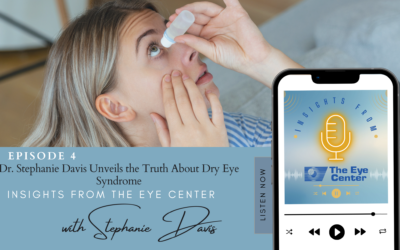Have you ever wondered why you sometimes see eye floaters, flashes, or stars in your vision? Photopsia is a medical term that refers to several visual disturbances including:
- Seeing stars
- Flashes of light
- Seeing sparkles in your vision
- Bright spots in your vision
- Floaters: A floater is a shadow, line, or cluster that moves across your vision slowly.
Why am I seeing stars, flashes, or floaters?
While the term “seeing stars” is often used to refer to the aftermath of a bump to the head, there are several reasons why people see stars or other related vision abnormalities. Depending on what makes you see stars, you may be able to ignore it, or you may require immediate medical attention. Some common causes of seeing stars or other symptoms of photopsia include:
- Rubbing your eyes or sneezing
- Head trauma
- Migraines
- Disturbances in the brain
- Retinal damage or detachment
- Pregnancy
- Rubbing your eyes or sneezing
- Eye diseases such as macular degeneration
Seeing tiny moving spots of light or another visual disturbance after rubbing your eyes or sneezing is quite common. Temporary physical pressure on the eyes activates cells in your retina, making you see light. Photopsia from rubbing your eyes or sneezing should be brief and is typically harmless.
Head trauma
One of the most common reasons someone may report seeing stars is from head trauma. A sudden blow to the head can interrupt normal brain functioning and cause your neurons to fire spontaneously. Your brain may interpret these signals as lights, spots, or flashes. After head trauma, you should get checked for a concussion and do as your doctor advises. If you notice any visual disturbances after a concussion, our optometric physicians offer concussion care in Pembroke Pines to help you recover and treat any vision issues stemming from this condition.
Migraines
Some people who get migraines will experience visual disturbances such as seeing spots, colorful lights, or floaters in their vision immediately before their migraine. This phenomenon is specifically referred to as aura and usually lasts for less than an hour.
Other disturbances in the brain
While rare, other brain disturbances outside of head trauma or migraines may cause someone to see stars including:
- Diseases like cerebrovascular disease
- Brain tumors
- Low blood pressure or a sudden drop in blood pressure
- Blood clots
Often these issues will interfere with the brain’s normal functioning and cause random firing of neurons in the occipital lobe, the area of the brain related to vision. These signals can be interpreted as floaters, bursts of light, or spots in someone’s vision.
Retinal damage or detachment
Retinal damage or detachment can cause photopsia symptoms such as seeing stars or spots in your vision. The retina is a layer of tissue in the back of the eye that senses light and sends signals to the brain. It can become inflamed, deteriorated, or detached from the back of the eye. A retinal detachment is a medical emergency and warrants immediate attention.
In other cases, disturbance to the vitreous gel, a special gel in front of the retina that protects it, may lead to visual disturbances. Floaters in your vision may also be a result of loose vitreous gel floating in your eye. When the retina or vitreous gel is disturbed, it can interfere with the messaging to the brain and lead to perceived lights or stars in vision.
Pregnancy
Because pregnant woman may have elevated blood pressure or glucose levels, it may lead to floaters in the eyes or other visual disturbances. In some cases, this may be a sign of a serious issue, so it is important to talk to your doctor immediately if you are experiencing these symptoms.
When to see a doctor about stars in your vision
In some cases, the cause of seeing stars is harmless and symptoms are fleeting, but other times, it may require immediate medical attention. You should see a doctor about seeing stars or other signs of photopsia if:
- They will not go away
- Both flashes and floaters are present in the same eye
- They are becoming more and more frequent
- You recently hit your head
- It appears like a veil has been pulled over your vision
- You are experiencing other symptoms like headaches or eye redness
No matter what causes floaters in your eyes or stars in your vision, it is important to seek medical attention if you suspect there may be a problem. Our optometric physicians at The Eye Center can assess your symptoms and diagnose the underlying issue during an eye exam in Pembroke Pines.
What to expect when seeing your eye doctor
When you go to an optometrist for stars and floaters in your vision, your doctor will likely perform a variety of tests such as dilating your pupils and conducting a digital scan of your eyes. These tests help them determine the root of the problem and provide you with a proper diagnosis. Once you have a diagnosis, your doctor will work toward creating a treatment plan if necessary.
If you are seeing stars or other visual disturbances, it may be time to visit our office. Contact us at The Eye Center today to make your appointment.





